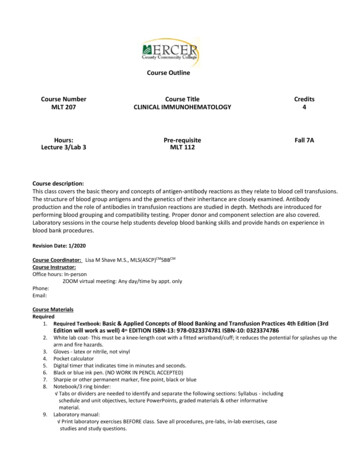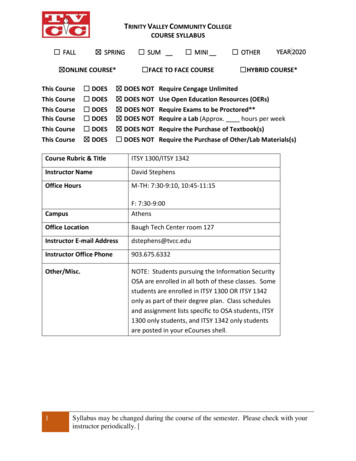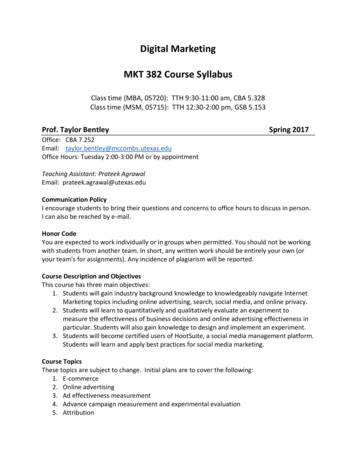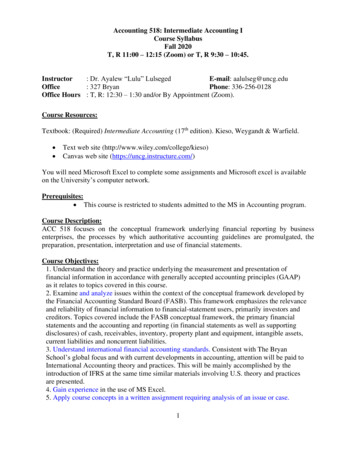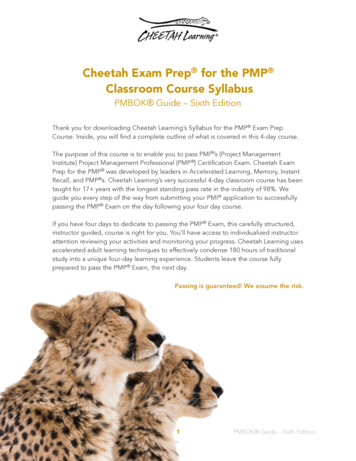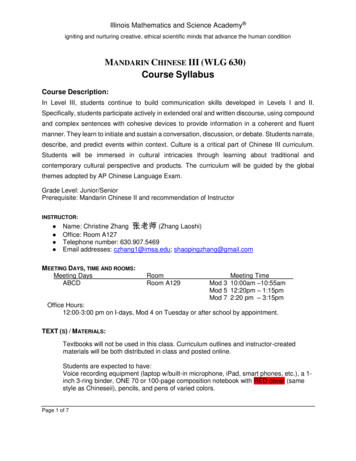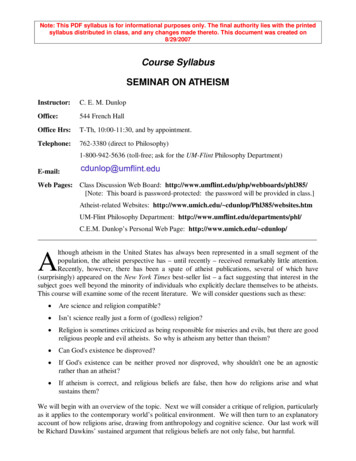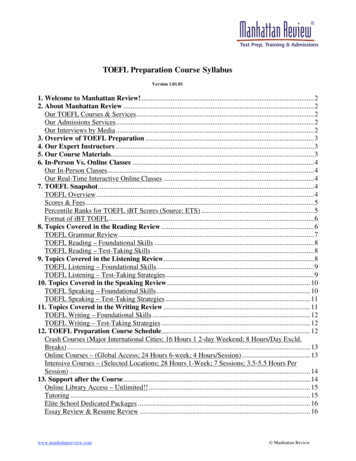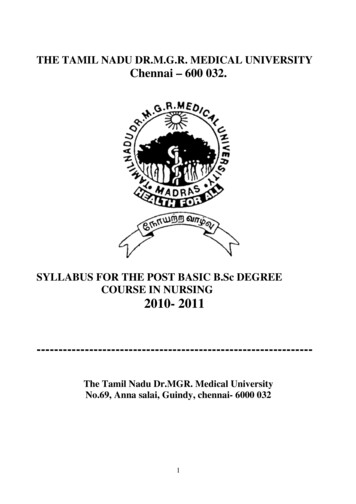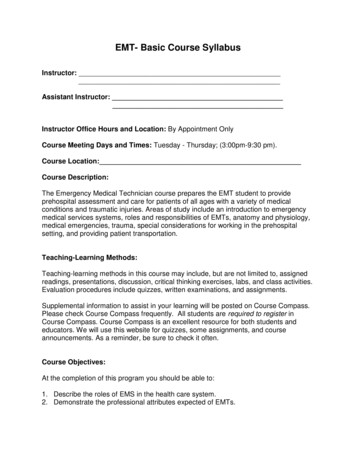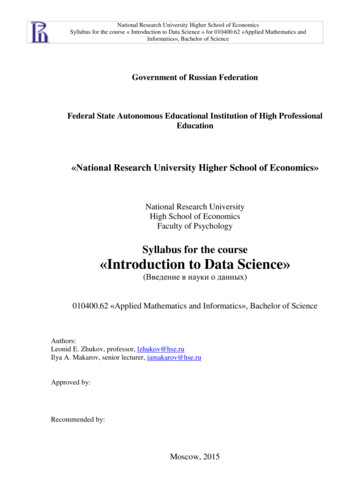
Transcription
National Research University Higher School of EconomicsSyllabus for the course « Introduction to Data Science » for 010400.62 «Applied Mathematics andInformatics», Bachelor of ScienceGovernment of Russian FederationFederal State Autonomous Educational Institution of High ProfessionalEducation«National Research University Higher School of Economics»National Research UniversityHigh School of EconomicsFaculty of PsychologySyllabus for the course«Introduction to Data Science»(Введение в науки о данных)010400.62 «Applied Mathematics and Informatics», Bachelor of ScienceAuthors:Leonid E. Zhukov, professor, lzhukov@hse.ruIlya A. Makarov, senior lecturer, iamakarov@hse.ruApproved by:Recommended by:Moscow, 2015
National Research University Higher School of EconomicsSyllabus for the course « Introduction to Data Science » for 010400.62 «Applied Mathematics andInformatics», Bachelor of ScienceIntroduction to Data ScienceCourse SyllabusI.Introduction: Subject and backgroundAuthor, Lecturer:Leonid E. Zhukov, Department of Data Analysis and Artificial Intelligence, ProfessorTutor:Ilya A. Makarov, Department of Data Analysis and Artificial Intelligence, Senior LecturerSummaryIntroduction to Data Science (IDS) course is designed as a bachelor-level course anticipatingfurther education at Master Science program “Data Science”. Data Science (DS) is a new,exponentially-growing field, which consists of a set of tools and techniques used to extract usefulinformation from data. Data Science is an interdisciplinary, problem-solving oriented subject thatlearns to apply scientific techniques to practical problems. The course orients on practical classesand self-study during preparation of datasets and programming of data analysis tasks.PrerequisitesGood mathematical background and programming skills sufficient enough to learn new languagesand software are required. Basic knowledge of statistics, linear algebra would be additional plus.The course has facultative status.Aims-To develop practical data analysis skills, which can be applied to practical problems.-To develop fundamental knowledge of concepts underlying data science projects.-To develop practical skills needed in modern analytics.-To explain how math and information sciences can contribute to building better algorithmsand software.-To give a hands-on experience with real-world data analysis.-To develop applied experience with data science software, programming, applications andprocesses.
National Research University Higher School of EconomicsSyllabus for the course « Introduction to Data Science » for 010400.62 «Applied Mathematics andInformatics», Bachelor of ScienceBackground and outlineIntroduction to Data Science (IDS) class is offered as a practical prelude to Data Science MasterScience program. Unlike the master-level, offering a great overview of various DS areas andapplications, the IDS class is more depth-oriented: a fewer problems and methods will be studied,but to a larger extent.This course is aimed at providing our students with a solid DS training, which could boost theircareers in one of TOP10 mostly required professions in the world. The course is based the mostrecent DS tools and developments, brought to the students from the author working experienceas a director of DS research department in several IT companies.While the choice of DS, its problems and projects already defines the novelty of this class, we aretrying to do our best to provide our students with the most up-to-date learning experience:-The lectures are taught online – convenient to attend and follow. Using the most currentteaching software packages, the students can fully interact with the instructor andclassmates, share desktops, share applications, record class videos, take online tests andquizzes.-The students work with real-world data. Unlike more conservative science classes, weprepare our students to solve real-world problems by working on these problems in theclass.-Independent work is appreciated. The class includes several mini-projects, which eachstudent has to design and implement on its own.-Analytical skills should evolve during classes. Students will work with noisy data, imperfectpractices, human errors, diverse equipment. We teach our students to take data as it is,and to make most efficient use of what’s available.-The following topics will be covered by this introductory course:o Data miningo Statisticso Machine learningo Information visualizationo Network analysiso Natural language processing
National Research University Higher School of EconomicsSyllabus for the course « Introduction to Data Science » for 010400.62 «Applied Mathematics andInformatics», Bachelor of Scienceo Algorithmso Software engineeringo Databaseso Distributed systemso Big dataThis class topic is new to HSE and Russian universities in general – and this is precisely the void weare trying to fill. DS programs start gaining their momentum in leading universities abroad, whichis another reason for HSE to cease the opportunity and to offer a competitive class in this field.Teaching notesThe lectures are offered online, with class material being rather complex and sometimes unusual.Therefore, full student engagement and interaction with the instructor becomes the key to theclass’ success. The lecture material is not to be uploaded for public usage.To keep the students as engaged as possible, we use a combination of teaching tools andmethodology:-Good online teaching software. Constant interaction with the students.-Class projects. While homeworks are meant to demonstrate the understanding of thecurrent class material, we use small class projects to help students develop their practicalDS skills. Students will also search web for proper datasets for some tasks.-Well-timed interaction during classes and office hours should stand for development andimprovement of students’ practical skills.Teaching outcomesThe main outcome of this class is to train a student to do practical DS work. Career-wise, weexpect our students to be able to develop into skilled DS researchers or software developers.After completing the study of the discipline IDS the student should: Know basic notions and definitions in data analysis, machine learning. Know standard methods of data analysis and information retrieval Be able to formulate the problem of knowledge extraction as combinations of datafiltration, analysis and exploration methods. Be able to translate a real-world problem into mathematical terms. Possess main definitions of subject field. Possess main software and development tools of data scientist. Learn to develop complex analytical reasoning.
National Research University Higher School of EconomicsSyllabus for the course « Introduction to Data Science » for 010400.62 «Applied Mathematics andInformatics», Bachelor of ScienceAfter completing the study of the discipline IDS the student should have the followingcompetences:Educative forms and methodsDescriptors (indicatorsaimed at generation andCompetenceCode Code (UC) of achievement of thedevelopment of theresult)competenceThe ability to SC-1SC-М1The student is able toLectures and classesreflect developedreflect developedmethodsofmathematical methodsactivity.to DS problems.The ability to SC-2SC-М2The student is able to Classes, labs, home works.propose a modelimprove and developto invent and testresearch methods fessionalmachine learning.activityCapabilityof SC-3development ofnewresearchmethods, changeof scientific andindustrial profileof self-activitiesThe ability to ivity in termsof humanitarian,economicandsocial sciences tosolve problemswhichoccuracross sciences,inalliedprofessionalfields.The ability to PC-8detect, transmitcommon goals inthe professionalSC-М3The student obtain Home tasks, paper reviewsnecessary knowledgein DS, which issufficient to developnew methods on othersciencesICM5.3 5.4 5.6 2.4.1The student is able to Lectures and tutorials, groupdescribereal-world discussions, paper reviews.problems in terms ofDS.SPC-M3The student is able to Discussion of paper reviews;identifyinformation cross discipline lecturesandmathematicalaspectsinsocial
National Research University Higher School of EconomicsSyllabus for the course « Introduction to Data Science » for 010400.62 «Applied Mathematics andInformatics», Bachelor of ScienceCompetenceandactivitiesDescriptors (indicatorsCode Code (UC) of achievement of theresult)socialEducative forms and methodsaimed at generation anddevelopment of thecompetenceresearches; evaluatecorrectness of the usedmethods and theirapplicability in eachcurrent situationRecommendations to the studentsThis class is meant to be interesting, and it’s meant to help you unveil a completely new area ofhuman knowledge, supporting the basic course on Data Analysis and Data Mining. It gives theopportunity to learn analytical skills and tools instead of only leveling coding skills. To anyonethinking about taking this class I would suggest the following:-Take it only if you are interested in learning something new-Be prepared to work-Be independent, and look for new, unusual solutions.-Do not miss/skip classes and homework. First, homework grades will be responsible for thebulk of your class grade. Second, each class is dedicated to a different area, and you do notwant to miss any of them.
National Research University Higher School of EconomicsSyllabus for the course « Introduction to Data Science » for 010400.62 «Applied Mathematics andInformatics», Bachelor of ScienceII.ScheduleNoTopicTotalhoursIn class hoursLecturesSelf-studyLabs1Introduction to data science61232Exploratory data analysis71333Introduction to machine learning71334Linear regression and regularization71335Model selection and evaluation71336Classification: kNN, decision trees71337Classification: SVM71338Ensemble methods: random forests71339Intro to probability:Naïve Bayes and 71337133hierarchical 5113logistic regression10Feature engineering and nality reduction: PCA and SVD713313Text mining and information retrieval713314Network Analysis713315Recommender systems713316Relational databases, SQL713317Big data storage and retrieval: noSQL, 7133-33GraphDB18Big data distributed computing: map- 6reduce, spark rdd
National Research University Higher School of EconomicsSyllabus for the course « Introduction to Data Science » for 010400.62 «Applied Mathematics andInformatics», Bachelor of Science19Advanced: neural networks and deep 6-33learning20Generalizing lecture41-321Presentations of final projects20--20Total152185480III.AssessmentThe assessment includes three components:-Class homework/projects, assigned after each lecture-Final projectThe class grade is computed as 70% of homeworks/projects 30% of the final project.In addition to this, student attendance, originality of work and contributions to the class will betaken into account, especially for those with non-zero fractional grade part.IV.ReadingRecommended:1. James, G., Witten, D., Hastie, T., Tibshirani, R. An introduction to statistical learning withapplications in R. Springer, 2013.2. Han, J., Kamber, M., Pei, J. Data mining concepts and techniques. Morgan Kaufmann, 2011.3. Hastie, T., Tibshirani, R., Friedman, J. The Elements of Statistical Learning, 2nd edition. —Springer, 2009.4. Murphy, K. Machine Learning: A Probabilistic Perspective. - MIT Press, 2012.Supplementary:“Practical Data Science with R”. Nina Zumel, John Mount. Manning, 2014“Data Science for business”, F. Provost, T Fawcett, 2013V.Topics for research work and class projects-Building recommender system-Constructing neural network for deep learning-Statistical data analysis
National Research University Higher School of EconomicsSyllabus for the course « Introduction to Data Science » for 010400.62 «Applied Mathematics andInformatics», Bachelor of Science-Implementation of decision tree modelThe syllabus is prepared by Leonid E. Zhukov, Ilya A. Makarov.
Syllabus for the course « Introduction to Data Science » for 010400.62 «Applied Mathematics and Informatics», Bachelor of Science Government of Russian Federation Federal State Autonomous Educational Institution of High Professional Education «National Research University Higher School of Economics» National Research University High School of Economics Faculty of Psychology Syllabus
